- Home
- Kathy Reichs
Bones in Her Pocket
Bones in Her Pocket Read online
Thank you for downloading this Scribner eBook.
* * *
Sign up for our newsletter and receive special offers, access to bonus content, and info on the latest new releases and other great eBooks from Scribner and Simon & Schuster.
CLICK HERE TO SIGN UP
or visit us online to sign up at
eBookNews.SimonandSchuster.com
I CLUNG TO AN UPRIGHT as the Mule bounced and lurched, engine churning, parts rattling like a junker from the Korean War. Though the sky was overcast, it was still warm for October. I blew upward in a vain attempt to unstick hair from my forehead, unwilling to release my death grip on the four-wheel-drive ATV.
However I’d pictured an artist colony, the image definitely involved more numerous and better maintained roads. This one consisted of dense forest, a cleared seam for power lines, and rough tracks spidering through bushy undergrowth. North Carolina meets Jurassic Park.
But I hadn’t come to commune with nature, or to nurture the creativity of my right brain. I’d come to recover a corpse.
My plan for the day had been a nice run on Charlotte’s Booty Loop, lunch with my friend Anne, and a crawl through the galleries in NoDa, the art district north of Davidson Street. I’d gotten as far as lacing my Nikes when the call came from my boss.
“It’s Saturday,” Anne had protested when I gave her the bad news. “Why can’t it wait?”
“You want to talk details of decomp before lunch?”
“Don’t they have cops for this kind of thing?”
“It’s my case.” As forensic anthropologist for the Mecklenburg County Medical Examiner, unidentifiable human remains were my domain. “A fibula, tibia, and two vertebrae were discovered at Mountain Island Lake a few weeks ago. Cops thought it was a missing person named Edith Blankenship.”
“I heard about her on the news. College kid, right?”
“Grad student at UNCC.” I referred to the University of North Carolina–Charlotte, my other employer.
“Not Edith?”
“Amelogenin testing indicated the bones came from a male,” I said.
“I love it when you talk dirty.”
“I still haven’t ID’d the guy.” John Doe was in a box at my lab. Case file: MCME-422-13. I’d requested a sonar scan of the cove where the bones washed ashore. Perhaps not needed now. Less paperwork. Small consolation.
Anne didn’t congratulate me for my commitment to public service.
“The same guy who found the bones thinks he’s spotted more.”
“And you have to retrieve the rest of Mr. Tibia Fibula.” Theatrical sigh.
“I might have time to meet you after.”
“Be sure to wash your hands.” Anne disconnected.
The Mule jogged left and shot downward through an invisible break in the trees, nearly tossing me headfirst out the open side. The guy at the wheel shouted over his shoulder.
“You good?” Slight accent.
“Dandy,” I managed.
My driver was an art cowboy named Emmett Kahn, his term not mine. He’d greeted me an hour earlier with a smile and a bone-crushing handshake.
I guessed Kahn’s age at somewhere north of sixty. Shaggy black hair, olive skin, lidded dark eyes, muttonchops the size of prime ribs. A successful art dealer, Kahn owned the three hundred acres through which we were taking Mr. Toad’s wild ride.
“I call the place Carolitaly because the property’s shaped like a boot. We’re heading to The Toe.” The last conveyed in capital letters. “Know much about Mountain Island Lake?”
I shook my head, jaw clamped. By the time we rattled to our goal, I’d need fillings replaced.
“The lake was created in 1929 to support the hydroelectric and steam stations. It’s fed by the Catawba River and is the smallest of the three man-mades in Mecklenburg County.”
“Big.” All I could muster was caveman speak. Land large. Drive bumpy. Tempe rattled.
“That’s why I have a caretaker. Skip handles security. ” Kahn tipped his head toward the block of cement riding shotgun. More Thud than Skip, the man was square in every sense of the word. Square shoulders, square back, brush cut that squared the top of his head. Aviator shades hid Skip’s eyes, but I hadn’t a doubt he was scowling.
“Skip’s a cop with Gaston County. Helps to have local grease, you know?”
The Mule leveled, allowing a clear sight line to the eastern horizon. Clouds hung low, dark and bloated with rain.
Smoother ground allowed me to yell, “I thought this was Mecklenburg.”
“County line runs through the middle of the lake. My property spans both sides. My man Skip knew Mecklenburg had a bone lady and suggested I call down there.”
Clever Skip. The CMPD had rolled it to the MCME. My boss had rolled it to me.
“Actually, I work for the medical examiner.”
“You’re a coroner?”
“Forensic anthropologist. I examine bodies too far gone for normal autopsy.”
“Like floaters.” Kahn’s use of the term suggested way too much television.
“Yes. And the skeletal, mummified, decomposed, dismembered, burned, and mutilated.”
“I’ve seen that on TV. You figure out how old the vic is. Man or woman, black or white. How they died, right?”
“Yes.”
“You can do that with just four bones?”
“Fragments are tough,” I shouted. “It’s good you found more.”
Something winged from a back tire and ricocheted off a boulder.
“We getting close?”
Kahn either ignored or didn’t hear my question.
“So the more bones, the easier to catch a murderer.”
“If it’s murder.”
I had my doubts. Mr. Tibia Fibula’s cortical surfaces were smooth and bleached. Too smooth and bleached. I suspected they’d been around for decades. My money was on a washed-out grave. North Carolina has relaxed laws on private burial. In the Appalachians, it wasn’t uncommon for Grandpa to end up in the backyard with Rover.
“Were all the bones found at the same location?” I bellowed over the roar of the engine.
“The first four washed up on Arch Beach. Want to detour over there?”
“Another time.” An ominous rumbling juddered from the clouds. “And today’s find?”
“At The Toe, facing the Meck side.”
“The opposite shore of the peninsula,” I clarified.
“When the river flooded last week the lake rose fifteen feet. The whole point was underwater, so the bag could have come from either side. Skip was checking out the damage when he saw it snagged on a tree. One whiff and he called me.”
Bag? Whiff? Apprehension rippled a neural pathway.
“I thought you found bones.”
Kahn beamed over his shoulder. “You insisted we call if we found anything else, so we did. We didn’t touch a thing, so the scene’s not compromised.” Definitely too much crime TV.
Irritation battled uneasiness. Was this a goose chase? A colossal waste of my Saturday?
With a twist of the wheel, Kahn jerked the Mule ninety degrees, bounced down a hill, and stopped just short of the water. When the motor died, the silence was deafening. “Here we are.”
I jumped out and surveyed my surroundings.
We were on a finger of land showing signs of recent submersion. Rippled soil. Scattered pebbles and shells. Mud-coated vegetation.
I looked a question at Skip. He gestured toward lake.
Branches snagged my hair as I picked my way toward the
water. Kahn and Mr. Loquacious waited upslope.
A dead fish lay on the muddy shoreline, guts ballooning like mushrooms from its belly. Surprisingly, few flies were availing themselves of the free lunch. Feeding elsewhere? Spooked by the coming storm?
I scanned the length of a pine tree lying half out of the water. Saw an oversized blue canvas bag ten feet out, its surface crawling with flies.
I turned to question my chatty companion. “You didn’t touch the bag?”
“Nope.” Skip could speak. “Smell was enough.”
“How long since you found it?”
“Two, three hours?”
I pulled on gloves, the neural pathways now pinging fortissimo. Smell? Flies on old bones?
Thankful I’d worn rain boots, I waded into the lake. The men watched without comment.
Footing was awkward. The mucky bottom sucked with every step I took. The water rose, eventually topping the rims and spilling into the boots, soaking my socks and chilling my feet.
At midthigh depth, I reached the bag and a waft of odor.
Hopes of viewing watercolors with Anne vanished instantly.
The flies. The odor. Something didn’t track.
I stared at the bag, debating. Call for help? Drag it ashore then phone the lab?
Clouds pulsed with electricity on the far side of the lake. The rumbling sounded louder.
Screw protocol. No way I wanted lightning frying my ass.
After shooting pics with my iPhone, I leaned toward the bag and tugged. My balance wasn’t good enough to free the thing.
I stepped closer. Calliphoridae bouncing off my face and hair, I yanked the handles from the branches on which they were snagged. The bag dropped with a smack.
Moving as quickly as my water-filled footwear allowed, I lugged my prize toward shore. Irritated flies trailed in my wake.
Skip helped drag the bag across the mud and up onto the rise. Water oozed from the canvas and poured from a six-inch tear on one side.
Back on terra firma, I took several more shots. Then I pulled the zipper and peeled back the top flap. Disenchanted, the flies set off for the fish. Sushi al fresco.
A skull stared out, orbits round and empty, as though startled by the sudden intrusion of sunlight. Hair covered the cranium and trailed the face like long, dark seaweed.
The body was clothed. Beneath the sodden fabric I could see remnants of ligament, a tag of gray-green tissue here and there.
That wasn’t what froze my breath in my throat.
The legs were tightly flexed, the bones slender tubes running below the muck-covered denim.
Legs.
Plural.
No way this was Mr. Tibia Fibula.
SKIP HELPED LOAD THE bag onto the Mule. The jarring ride might cause damage, but I didn’t want to wait. Lightning was streaking in earnest now.
Our return was subdued, even Kahn silent. At the compound, I picked up sufficient signal to make a call.
Tim Larabee, head pathologist at the MCME, was as surprised as I was. He’d sent me out fully expecting old bones.
Larabee asked if I could toss the bag into my trunk. Hell, no. I’d done that before. Once. The smell lingered in my car as long as I owned it. Maybe in my mind. Either way, I wasn’t going there again.
Larabee promised a transport van.
We waited amid cabins more suited to the Alps than the Carolina foothills. Kahn explained that they contained studios for the use of visiting artists, but I saw no signs of another’s presence. Skip said nothing.
After twenty minutes, Kahn excused himself to handle some business. I wondered if he planned to heads-up his lawyer. Skip stayed with me. Silent as ever.
“Mountain Island Lake sounds like they couldn’t make up their minds.” My stab at small talk.
“Mountain’s that island in the middle.” Chin-cocking the water.
“Must be deep.”
“Six hundred and fifty feet. Lake’s 3,300 acres, 61 miles of shore.” Two sentences. Skip was on a roll.
“That’s a lot of lake,” I said.
“People in Charlotte drink a lotta water.”
“Word of today leaks out they may to switch to bottled.”
Skip didn’t appreciate my humor. “We haul in five or six bodies a year. Mostly drunk boaters. Some we never find.”
Maybe I’d switch to Evian.
Kahn rejoined us, so I directed my questions to him.
“How many people have access to this area?”
“Only my family, my guests, and Skip. At the moment we have two artists in residence. We change the gate code when we think of it, but the place is large and, frankly, porous.”
“Fenced?”
Kahn waggled a hand. Yes and no. “We share a boundary fence with the Duke Energy folks. But it’s old and pretty much ignored, except by me.”
“The Riverbend Steam Station?” I’d seen it driving in, a hulking set of smokestacks, brick boxes, conveyers, and tangled wiring that looked like something out of a post-apocalypse film.
“Yeah. It’s a coal-fired power plant built in ’29 when the lake was created. Riverbend was brought online to supplement the supply when demands for electricity were highest. The place is so decrepit and poorly maintained the locals are rabid. And the situation has gotten worse since Duke shut her down a few months back. Environmental groups are screaming that coal ash is leaking from the lagoons into the lake, suing for cleanup. We’ll see how that goes.”
“So anyone could access the peninsula? The Toe?” My gut told me the bag was a water dump, but I wanted my bases covered.
Kahn shrugged one shoulder. “Sure. Just blow off the NO TRESPASSING signs. This area used to be Hells Angels turf, so we still get bikers hot-rodding the trails, buzzing us in boats, that kind of thing.”
“Any indications of recent entry?”
Kahn turned to Skip. “You good here?”
Skip nodded.
“Please phone when the van arrives.” To me. “Let me show you something.”
Before I could respond, Kahn circled a cabin and set off down a path barely visible in the underbrush. I followed.
“At Carolitaly we try to integrate art with nature.” Kahn spoke as we walked. “Throughout the compound are living installations. Beauty in unanticipated places.”
“Ah.” I was clueless.
Five yards into the woods, Kahn stopped and arced an arm skyward. “Beauty in the trees.”
A Plexiglas and metal capsule sat affixed to the branches of an oak ten feet above our heads.
“Let me guess. A space ship?”
“A vessel for the contemplation of space. A person seeking tranquility can sit inside and meditate. Glass allows light to enter, but enclosure prevents distraction, allowing one to direct one’s thoughts inward.”
“Ah.” Modern art, not my thing.
Kahn continued toward a pine-needle-covered mound outfitted with a refrigerator door and porthole. Wordlessly, he tugged open the door and directed me to look inside.
A buried pod held a round table surrounded by a curved bench. The walls, floor, ceiling, and furnishings were plastic, a warmthless, hospital white.
“Up to three people can survive underground for days.”
Not this chick, I thought.
“There are thirteen of these on the property. Thirteen is the number for rebellion, apostasy, defection, disintegration, revolution.”
A survivalist’s wet dream.
“For a while now I’ve been seeing signs of a squatter at some of the pods.”
“Any idea who?”
“Ever heard of monkey-wrenching?”
“Eco-terrorism.”
Kahn nodded. Ran a hand over his jaw.
“The fellow you want to talk to is that wing nut, Herman Blount.
Back in August, Blount posted some videos online threatening to blow up the Riverbend station. Then he went off the grid.”
“You think Blount’s gone to ground on your property?”
Kahn nodded glumly.
“If anyone’s capable of violence, it would be Blount.”
WHEN I ENTERED THE Mecklenburg County Medical Examiner facility early Monday morning, Mrs. Flowers, the receptionist, was at her post. As usual, her outfit was floral, her hair a perfectly permed and sprayed peach helmet.
I waved, crossed the reception area, and carded my way into the biovestibule leading to the autopsy suites and staff offices. “Biovestibule” is what you call a three-hundred-million-dollar hallway. Hot damn.
Our recently built, state-of-the-art, Leed-certified MCME facility still has that new-car smell. After decades in the old, refurbished Sears-Garden-Center-make-do quarters, everyone on staff is loving the new digs.
I headed to autopsy room four, one of a pair specially ventilated for aromatics: decomps, floaters, putrefied corpses. My stinkers.
As I detoured to my office to lock my purse in a drawer, Larabee appeared. In his off time, the chief enjoys long-distance running. A lot of it. The hours on the pavement have turned him into a lean and leathery Ichabod Crane in surgical scrubs.
“How’d it go at Mountain Island Lake?”
“Beat the storm.” I straightened to face him.
“Joe said it rained like hell on the drive back. Wind almost knocked the van off the road.”
Joe Hawkins has been a death investigator with the MCME since before Moses discovered clay.
“I didn’t see Joe’s name on the sign-in board. Where is he?”
“Out with pink eye. Do you mind working alone?”
“I mind it less than pink eye. Where are my bones?”
“In the cooler. Joe did prelim photos and X rays, then left everything on the gurney.”
“Busy weekend?”
“Not bad. One stabbing, an electrical death, and a murder-suicide. Nothing for you.”
In our strange industry, that roster qualified as “not bad.”
“Keep me looped in.” With this, Larabee was gone.

 Two Nights
Two Nights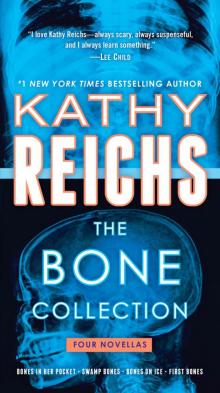 The Bone Collection: Four Novellas
The Bone Collection: Four Novellas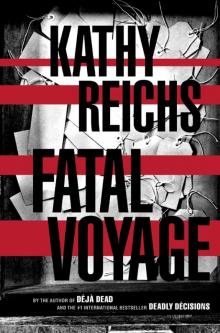 Fatal Voyage
Fatal Voyage 206 Bones
206 Bones Bones to Ashes
Bones to Ashes Terminal
Terminal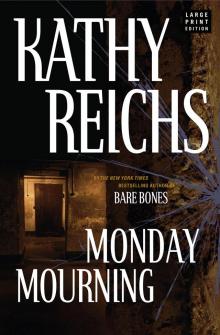 Monday Mourning
Monday Mourning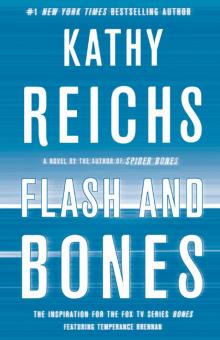 Flash and Bones
Flash and Bones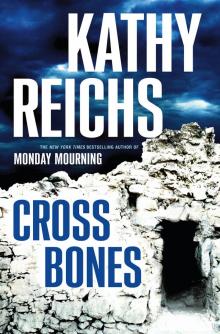 Cross Bones
Cross Bones Devil Bones
Devil Bones Break No Bones
Break No Bones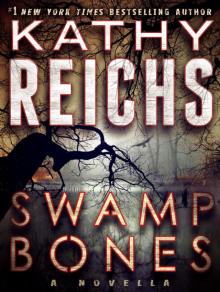 Swamp Bones
Swamp Bones Déjà Dead
Déjà Dead Shock
Shock Spider Bones
Spider Bones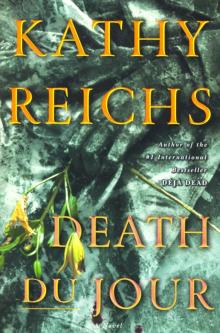 Death Du Jour
Death Du Jour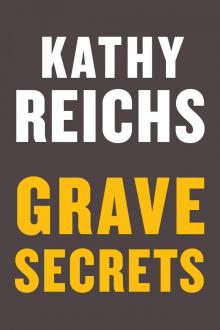 Grave Secrets
Grave Secrets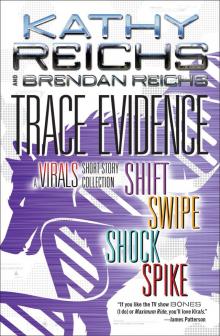 Trace Evidence: A Virals Short Story Collection
Trace Evidence: A Virals Short Story Collection Bones on Ice
Bones on Ice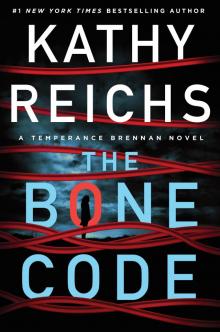 The Bone Code
The Bone Code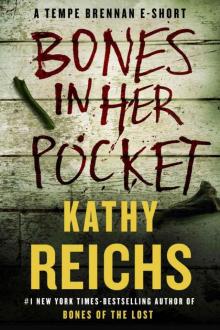 Bones in Her Pocket
Bones in Her Pocket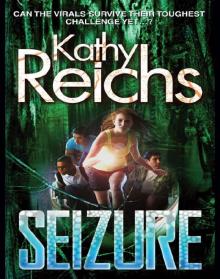 Seizure:
Seizure: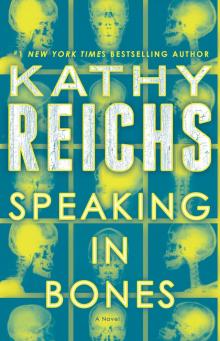 Speaking in Bones
Speaking in Bones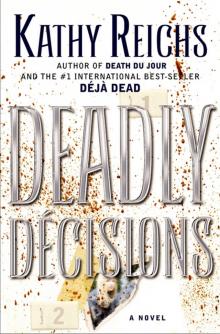 Deadly Decisions
Deadly Decisions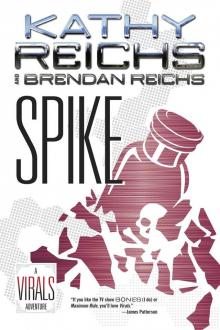 Spike
Spike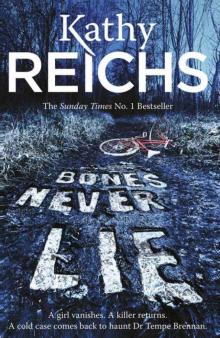 Bones Never Lie
Bones Never Lie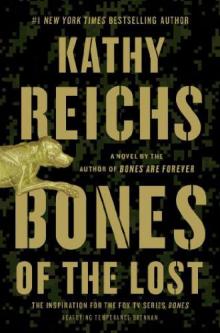 Bones of the Lost
Bones of the Lost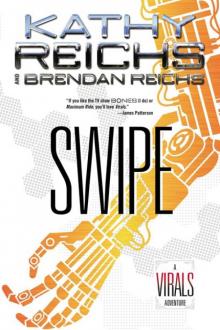 Virals 03.5 - Swipe
Virals 03.5 - Swipe Exposure
Exposure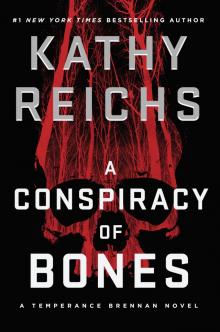 A Conspiracy of Bones
A Conspiracy of Bones Shift (tory brennan)
Shift (tory brennan) Bones of the Lost: A Temperance Brennan Novel tb-16
Bones of the Lost: A Temperance Brennan Novel tb-16 Virals tb-1
Virals tb-1 Bones Are Forever tb-15
Bones Are Forever tb-15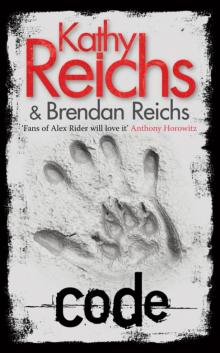 Code tb-3
Code tb-3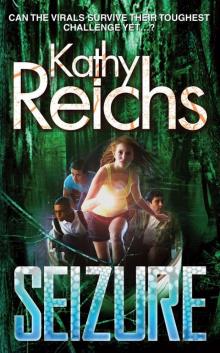 Seizure tb-2
Seizure tb-2 Deadly Descisions
Deadly Descisions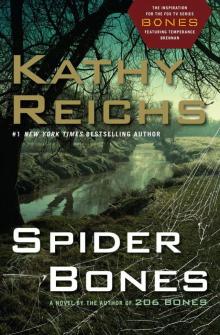 Spider Bones: A Novel
Spider Bones: A Novel